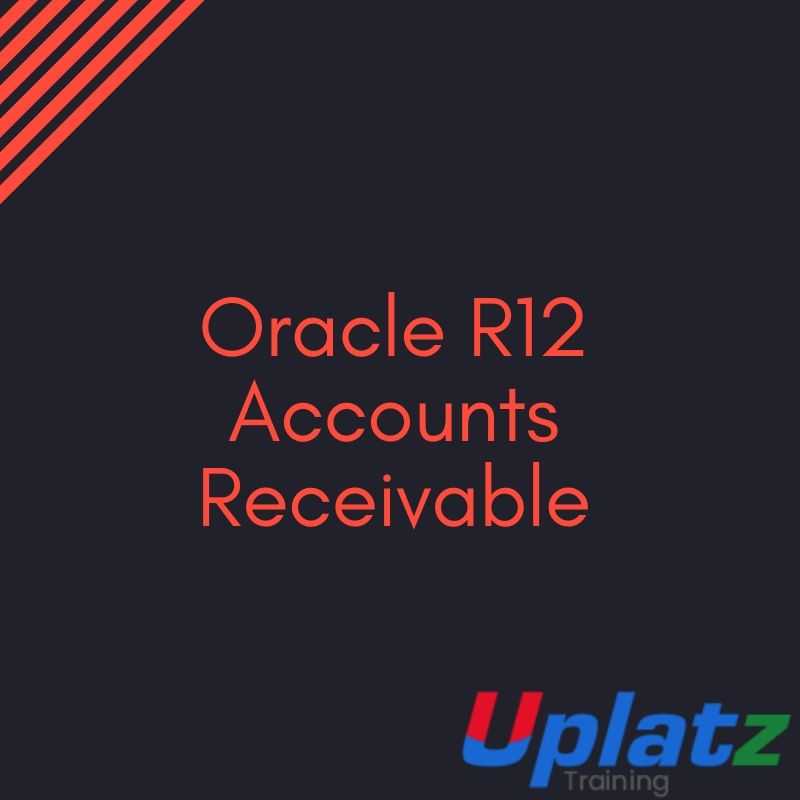Oracle R12 Accounts Receivable

Oracle R12 Accounts Receivable Course Overview
The Oracle R12 Accounts Receivable course is designed to give delegates practical experience of working with the Oracle Accounts Receivable module. It is end-user focused and includes all the day to day tasks such as setting up customer accounts, raising invoices and credit notes and applying cash together with making inquiries and running standard reports.
-------------------------------------------------------------------------------------------------------------------------------------------
Who will the Course Benefit?
This Oracle R12 Accounts Receivable training course is designed for personnel working within Finance and Accounts Receivable departments. It is suitable for end users or their supervisors, or equally for management or financial accountants or first line support staff. Delegates should have knowledge of the accounts receivable function within their own organisation.
Course Objectives
To provide the skills necessary to manage customers, process invoices, apply receipts from customers to invoices and accounts, carry out enquiries, submit reports, close Accounts Receivable periods and transfer transaction details to the General Ledger.
Oracle R12 Accounts Receivable
Oracle R12 Accounts Receivable Training Course
Course Introduction
- Administration and Course Materials
- Course Structure and Agenda
- Delegate and Trainer Introductions
Session 1: INTRODUCTION
- Overview of Oracle Receivables
- New Features in Release 12 Receivables
- Integration with Other Modules
- Receivables Interfaces
- Overview of Receivables in the Order to Cash Process
Session 2: OVERVIEW OF THE CUSTOMER DATABASE
- Overview of the Customer Database
- Customer Profile Classes
- Customer Accounts
Session 3: MANAGING CUSTOMERS
- Create and Apply a Customer Profile Class
- Find a Customer
- Find a Range of Customers
- Create a New Customer
- Amend Customer Details
- Merge Customers
Session 4: TRANSACTIONS
- Overview of the Transaction Process
- Invoices
- Tax Considerations - VAT
- Automatic Account Generation
- Print Transactions
- Debit and Credit Memos
- Receipts
- Adjustments
- Commitments
- Refunds to Customers
- Transfer to Doubtful Debt
Session 5: INVOICING
- Raise an Invoice
- Raise an Invoice Batch
- Enter Invoices with Instalments
- Enter and Apply a Deposit
- Create a Copy Invoice
- Void an Invoice
- Raise a Credit Note
- Raise a Credit Note on Account
- Apply a Credit Note on Account
- Project Billing and Project Invoices
Session 6: RECEIPTS PROCESSING
- The Receipt Process
- Receipt Creation Methods
- The Receipts Window
- Receipt Status
- Enter a Manual Receipt
- Enter/Apply a Foreign Currency Receipt
- Review a Receipt
- Reverse a Receipt
- Reverse a Reconciled Receipt
- Remit a Receipt
- Manual Receipts Compared To QuickCash Receipts
- Receipt Batches
- Search and Apply
- Process a QuickCash Batch
Session 7: CUSTOMER FOLLOW-UP
- Review a Customer Account
- Review Balances by Aging Bucket
- View Transactions
- Disputed Items
- Credit Holds
- Dunning Letters
- Statements
- Create a Task
Session 8: POSTING
- Create Accounting
- Submit Accounting
- Revenue Recognition
- The Posting Execution Report
Session 9: RECONCILIATION
- Customer Account and Balance Due
- Receivables Accounting Periods
- Reconcile Receivables
- Reconciliation Reports
- Reconciliation Processes
Session 10: IMPLEMENT CUSTOMER INVOICING
- Transaction Types and Sources
- Payment Terms
- System Options
- Collectors
- Taxable Freight Charges
Session 11: IMPLEMENT RECEIPTS
- Receivables Activities
- Create a Receivables Activity
- Create a Distribution Set
- Tax Code Source
- Define Bank Accounts
- Define a Receipt Class
- Receipt Sources
- Define Document Sequences
Session 12: RECEIVABLES PROFILE OPTIONS
- Tax Profile Options
- Accounts Receivable Profile Options
Session 13: AR CREDIT MEMO APPROVAL PROCESS
- Place an invoice in dispute
- Approval levels
- View Dispute History
- Define Approval Limits
- Assign the Receivable Role to a User
- Worked Example with Approval
- Worked Example with Rejection
Session 14: CUSTOMER REFUND PROCESSING
- Define a Receivable Activity for Refunds
- Specify Receipt Handling for Credits
- Define Receipt Method Defaulting Rule
- Refund by Electronic Payment Method
- Worked Example
Session 15: AUTOINVOICE INTERFACE
- Use the Autoinvoice Interface to Generate Invoices
Session 16: ACCOUNTS RECEIVABLE EXERCISES
- Create a Customer Profile Class
- Enter New Customers
- Enter Batches of Invoices
- Copy Invoices
- Void a Transaction
- Enter Credit Notes for Specific Invoices
- Create an On-Account Credit Memo
- Enter Receipts for Single Invoices
- Enter Receipts for Multiple Invoices
- Enter a Miscellaneous Receipt
- Enter an Unidentified Receipt
- Reverse a Receipt
- Reapply a Receipt
- Adjustments and Write-Offs for an Invoice
- Approve Adjustments and Write-Offs
- Create an Automatic Receipts Batch
- Create a Remittance Batch
- Run a Standard Report
Session 17: DEBT MANAGEMENT EXERCISES
- Amend Customer Details
- Merge Customer Details
- View Customer Account Information
- Customer Search Inquiry
- Place an Invoice Item in Dispute
- Remove an Invoice Item in Dispute
- Place a Customer Account on Credit Hold
- Generate Statements








